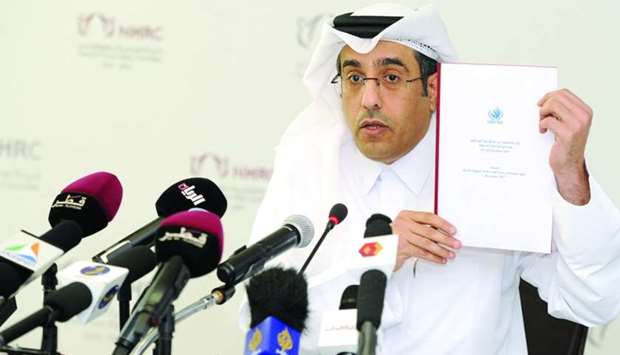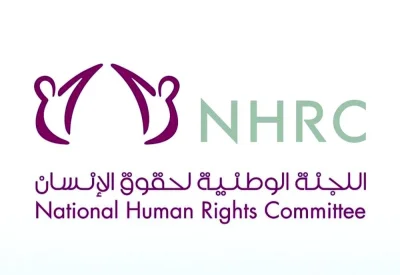The visit took place to investigate the repercussions of the siege imposed by the Saudi-led quartet on the human rights practices and the humanitarian situation of the citizens, residents and GCC citizens who stay in Qatar.
NHRC chairman Dr Ali bin Smaikh al-Marri praised the results of the report despite some observations concerning the statistics of the affected Qataris due to the measures taken by the siege countries, in addition to not shedding enough light on some violations.
Al-Marri described the report as a first-of-its-kind to be published by a United Nations (UN) agency, condemning the siege countries and document the worst violations due to their arbitrary procedures and measures.
“The report unequivocally affirms that the measures taken by the siege countries are arbitrary and unilateral which also explicitly violate international law and the principles of international relations and human rights conventions.
“The report asserts that what happened in Qatar is not only the severance of diplomatic relations but the violations amount to collective punishment.
“The report added that the violations that the citizens, residents and GCC citizens who reside in Qatar face, are not allegations as stated by the siege countries, but are facts confirmed by conclusive evidence,” al-Marri said.
The NHRC chairman reiterated that the report is an important legal reference which will reflect the diplomatic and legal moves, regionally and internationally.
“It also demonstrates the siege countries' lack of intention to alleviate the suffering of the victims, but there is persistence and intransigence from those countries to aggravate the humanitarian situation,” he added.
Al-Marri called on the OHCHR to take further steps on all levels of international human rights mechanisms and the UN Human Rights Council (UNHRC), to raise the issue of the siege's repercussions in the general report of the Secretary-General of the UN, the report of the High Commissioner for Human Rights at the next session of the UNHRC and the reports of UN special rapporteurs to the UNHRC.
He also called on the OHCHR to communicate with specialised international agencies such as the International Labour Organisation, Unesco, World Trade Organisation and International Civil Aviation Organisation with the aim of sharing information and support complaints against the siege countries.
Al-Marri called for rapid action to address the issues of siege victims and invite the technical mission to visit the four blockading countries, to find out the effects of the siege on their citizens and citizens of Qatar.
The NHRC chairman pointed that the UN Office of High Commission for Human Rights will hold a meeting with its Department of Special Procedures to hand over the cases to the UN Special Rapporteurs, according to their competence. It will also meet with the diplomatic missions of the siege countries to the UN in Geneva to inform them of the report.
The report of the substantive mission of the OHCHR officially described the measures taken by the siege countries as arbitrary unilateral measures, in accordance with the UN definition and standards, pointing out that they were unequal and racist and that such measures were not officially reported and had no legal motives.
The report stressed that the actions taken by the siege countries do not differentiate between the government and civilians, especially Qatari nationals, describing that as "dangerous". It also described the economic effects of the siege as amounting to economic wars. Despite Qatar's ability to absorb them, the economic effects on individuals are still large psychologically and materially, the report said.
The report also highlighted the negative and dangerous impact of unilateral measures on the population as a result of the incitement campaigns, media defamation and hate campaigns against Qatar, its leadership and people, adding that most cases affected by the current situation are unresolved and the situation of the victims is likely to continue and worsen.
Meanwhile, the report praised the positions of the government of Qatar, which did not take retaliatory measures against the nationals of the siege countries and lauded Qatar's role in the search for solutions to the worsening humanitarian cases of the victims.
The report referred to numerous violations such as hate speech, incitement and restrictions on the freedom of expression by the siege countries, as well as violations of the rights to freedom of movement, communication, religious observance and family reunification and the impact on economic rights, the right to property, health and education.

NHRC chairman Dr Ali bin Smaikh al-Marri displays a copy of the report submitted by the UN technical mission from the Office of the High Commissioner for Human Rights. PICTURE: Nasar T K
The National Human Rights Committee (NHRC) has welcomed the report submitted by the UN technical mission from the Office of the High Commissioner for Human Rights (OHCHR) which visited Doha between November 17 and 24, 2017.


